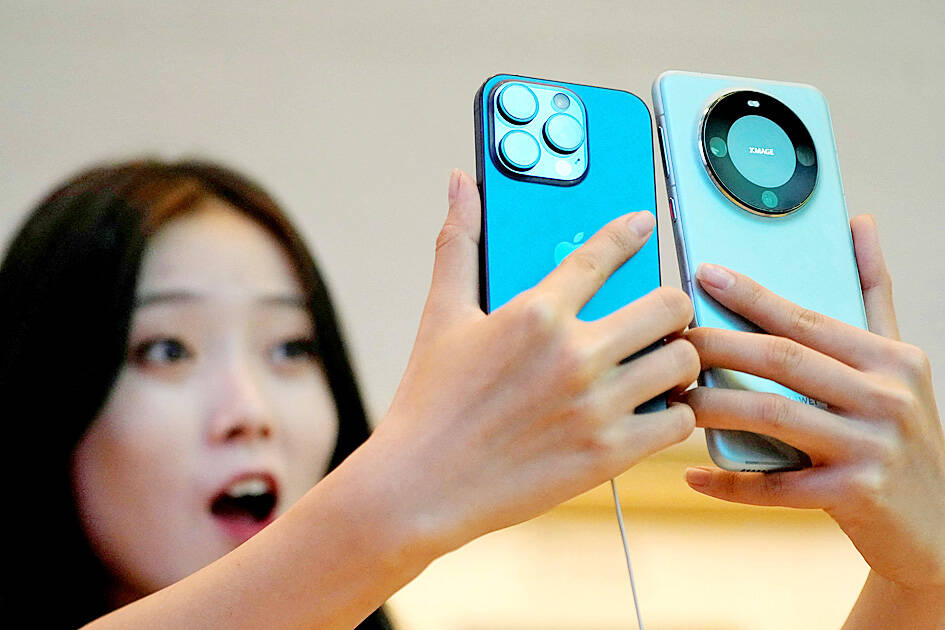Apple Inc’s new iPhone 15 is selling far worse in China than its predecessor, separate analyses showed, reflecting stubbornly weak consumption as well as the rise of rivals such as Huawei Technologies Co (華為).
Sales of Apple’s flagship device are down 4.5 percent compared with the iPhone 14 over their first 17 days after release, market tracker Counterpoint Research estimated in previously unreported figures provided to Bloomberg News.
Jefferies analysts led by Edison Lee (李裕生) yesterday said that sales of the iPhone 15 were down by an even sharper double-digit percentage from its predecessor after Huawei outsold Apple overall, powered by the surprising debut of the Mate 60 Pro.

Photo: Reuters
The twin reports mark a potential blow to Apple at a time it is grappling with the weakest smartphone demand in a decade and a backlash from overheating models.
If the initial estimates are accurate, they represent one of the iPhone’s worst debuts in China since about 2018, when local names such as Oppo Mobile Telecommunications Corp (歐珀) and Vivo Communication Technology Co (維沃) began to captivate Asian consumers.
Counterpoint blamed the iPhone’s slump in China mainly on an economy struggling to rebound from its COVID-19 trough.
It added that in the US, the iPhone 15 likely posted a double-digit percentage rise over last year in the first nine days of sales.
However, the iPhone’s debut in China came weeks after the launch of the Mate 60 Pro, celebrated as a triumph over US sanctions because of its advanced made-in-China processor.
It also coincided with a government mandate to expand a ban on iPhone use to government agencies and state companies, underscoring Apple’s growing challenges there.
“The US is hot right now with back-to-back stellar weekends for the new iPhone,” Counterpoint research director Jeff Fieldhack said. “It’s a positive sign from the biggest iPhone market in the world. So definitely takes some of the sting off the China numbers.”
Analysts remain divided about the longer-term effect in China, the world’s largest smartphone arena. Many analysts argue Huawei’s rising prominence could erode Apple’s dominance of the higher end of the market.
Counterpoint said that the Chinese company could sell 5 to 6 million units of the Mate 60 Pro alone this year.
Analysts said that could rise to the double digits next year.
Huawei has now taken the top spot in the market from Apple, Jefferies wrote in a note.
“The trend suggests iPhone would lose to Huawei in 2024,” Lee and colleagues wrote. “We believe weak demand in China would eventually lead to lower-than-expected global shipments of iPhone.”

MULTIFACETED: A task force has analyzed possible scenarios and created responses to assist domestic industries in dealing with US tariffs, the economics minister said The Executive Yuan is tomorrow to announce countermeasures to US President Donald Trump’s planned reciprocal tariffs, although the details of the plan would not be made public until Monday next week, Minister of Economic Affairs J.W. Kuo (郭智輝) said yesterday. The Cabinet established an economic and trade task force in November last year to deal with US trade and tariff related issues, Kuo told reporters outside the legislature in Taipei. The task force has been analyzing and evaluating all kinds of scenarios to identify suitable responses and determine how best to assist domestic industries in managing the effects of Trump’s tariffs, he

TIGHT-LIPPED: UMC said it had no merger plans at the moment, after Nikkei Asia reported that the firm and GlobalFoundries were considering restarting merger talks United Microelectronics Corp (UMC, 聯電), the world’s No. 4 contract chipmaker, yesterday launched a new US$5 billion 12-inch chip factory in Singapore as part of its latest effort to diversify its manufacturing footprint amid growing geopolitical risks. The new factory, adjacent to UMC’s existing Singapore fab in the Pasir Res Wafer Fab Park, is scheduled to enter volume production next year, utilizing mature 22-nanometer and 28-nanometer process technologies, UMC said in a statement. The company plans to invest US$5 billion during the first phase of the new fab, which would have an installed capacity of 30,000 12-inch wafers per month, it said. The

Taiwan’s official purchasing managers’ index (PMI) last month rose 0.2 percentage points to 54.2, in a second consecutive month of expansion, thanks to front-loading demand intended to avoid potential US tariff hikes, the Chung-Hua Institution for Economic Research (CIER, 中華經濟研究院) said yesterday. While short-term demand appeared robust, uncertainties rose due to US President Donald Trump’s unpredictable trade policy, CIER president Lien Hsien-ming (連賢明) told a news conference in Taipei. Taiwan’s economy this year would be characterized by high-level fluctuations and the volatility would be wilder than most expect, Lien said Demand for electronics, particularly semiconductors, continues to benefit from US technology giants’ effort

‘SWASTICAR’: Tesla CEO Elon Musk’s close association with Donald Trump has prompted opponents to brand him a ‘Nazi’ and resulted in a dramatic drop in sales Demonstrators descended on Tesla Inc dealerships across the US, and in Europe and Canada on Saturday to protest company chief Elon Musk, who has amassed extraordinary power as a top adviser to US President Donald Trump. Waving signs with messages such as “Musk is stealing our money” and “Reclaim our country,” the protests largely took place peacefully following fiery episodes of vandalism on Tesla vehicles, dealerships and other facilities in recent weeks that US officials have denounced as terrorism. Hundreds rallied on Saturday outside the Tesla dealership in Manhattan. Some blasted Musk, the world’s richest man, while others demanded the shuttering of his